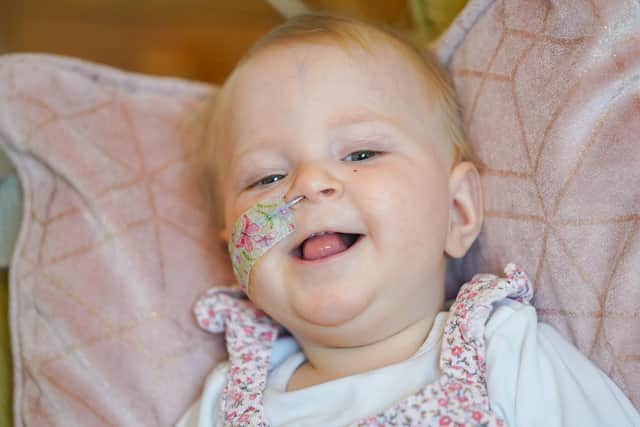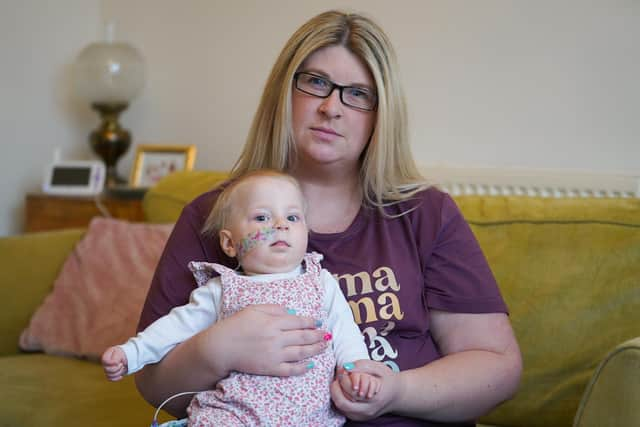One-year-old with rare genetic condition waiting five months for operation on NHS, says mother
Rowanna Cookson, one, suffers from a rare genetic disorder called CTNNB1 which means her stomach doesn't allow her to eat normally and that her muscles are weak. She is only one of 500 people in the world with the disorder and when she was seven months old, her mum Amy Cookson, 36, was told Rowanna would need an operation.
Rowanna is fed through a tube through her nose which has the risk of the liquid going into her lungs but the surgery will allow her to be fed straight to her stomach. But Amy said that although Rowanna was assessed for the operation in December and was told she could have it in a couple of weeks, she still hasn't had the surgery.
Advertisement
Hide AdAdvertisement
Hide AdNow Amy, who is Rowanna's full time carer, has said that she 'doesn't blame the nurses' but instead 'blames the people in charge.'


Amy said: "I don't blame the nurses, they are great and think she needs the operation. I blame the people in charge, the system, and Government policies. Its not working. Most recently, they've blamed the junior doctors strike. But she was referred on December 5 and saw a consultant in February.
"I've signed the consent forms and pre-op. We want the operation as soon as possible. Rowanna deserves to be fed properly and safely, it's as simple as that. Rowanna has a lifetime of disability ahead of her. The least we can do is get her fed comfortably and safely."
She is due to have the operation in May at Sheffield Children's Hospital but Amy said it wouldn't surprise her if that got cancelled as well. Meanwhile the tube in her nose causes discomfort and she sometimes pulls it out.
Advertisement
Hide AdAdvertisement
Hide AdBut despite all of this, she has still said that Rowanna is 'so smiley' and that 'everyone says how happy and smiley she is.'


Amy, of Sheffield, said: "She's so smiley - she has such a happy demeanour and giggles a lot. Everyone says how happy and smiley she is. She's always really patient when she gets taken into the hospital."
Craig Radford, chief operating officer at Sheffield Children's NHS Foundation Trust has said that the hospital are 'doing everything they can' to reduce waiting times.
He said: "Across Sheffield Children's our teams are doing everything they can to see patients as soon as possible as we know how difficult it is to wait to access care. As we provide a number of specialist services we have a high number of patients coming to us for care they can't receive elsewhere.
Advertisement
Hide AdAdvertisement
Hide Ad"We are reducing waiting times in a number of ways, including introducing more weekend and evening clinics and surgery options for some specialities. We are seeing a decrease in waiting times for patients but we're continuing to work hard and find new ways to see people as quickly as we can to avoid any further delay."
A Department of Health and Social Care spokesperson said: "Cutting waiting lists is one of the Prime Minister's top five priorities and the longest waits for treatment are falling, backed by a record £14.1 billion over the next two years to address the most pressing issues facing the NHS and social care.
"The NHS successfully met the first target in our plan to virtually eliminate waits of over two years and has cut 18 month waits by over 50 per cent in a year. NHS trusts are using innovative surgical hubs and surgical robotic systems to help drive up the number of operations and improve outcomes for patients."